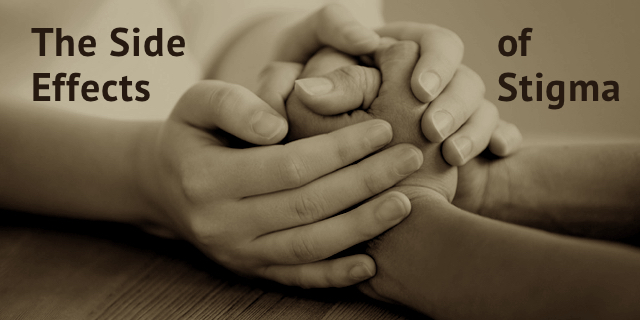With knives or branding irons, ancient Greeks would mark criminals or traitors to indicate that they should be shunned and not welcomed in society. The Greeks called that mark a stigma. Today, to stigmatize a person is to classify them by a negative attribute and devalue them on that basis alone.
Stigmatizing is a cross-cultural and cross-species phenomenon. There are psychological and sociological theories for why people stigmatize others. Psychological researchers see it as a way of making understanding others less important–instead of understanding people as intricate and multi-faceted, it is easier to reduce them to categories. Other researchers believe that people stigmatize to enhance their self-esteem or to inflate themselves. Other theories state that stigmatizing is a strategy to justify a privileged position in society or as a way to substantiate one’s perspective or worldview.
theories for why people stigmatize others. Psychological researchers see it as a way of making understanding others less important–instead of understanding people as intricate and multi-faceted, it is easier to reduce them to categories. Other researchers believe that people stigmatize to enhance their self-esteem or to inflate themselves. Other theories state that stigmatizing is a strategy to justify a privileged position in society or as a way to substantiate one’s perspective or worldview.
Sociologists recognize shunning behaviors in groups of apes, especially when an ape does not share or reciprocate. They see stigmatization as a function of living in a group: but even though that may be adaptive or “natural,” it does not make stigmas right or morally justifiable in humans.
Opioid Stigma
Recently I co-wrote an article that appeared on STAT called “Opioid stigma is keeping many cancer patients from getting the pain control they need.” The research looked at what people with cancer said  about their experience trying to get opioids for pain relief. From health care providers…
about their experience trying to get opioids for pain relief. From health care providers…
“Some writers said their doctors now hesitate to prescribe opioids due to concerns over addiction. Restrictions on refills and their timing are barriers to consistent use of medications to treat pain. Many of the writers said they felt they were being treated like drug seekers when their pain needs are real and management is necessary.”
to society in general…
“While the stigma from health care providers can affect cancer patients’ access to pain medications, it is the stigma from society that affects their use. Many writers indicated that they feared becoming addicts and worried about withdrawal symptoms. They also offered concerns about what use of high doses or multiple daily pain pills says about them.”
…this stigma impacts quality of life. Although this research was conducted on what patients with cancer said, the volume of response to the article indicates that the opioid stigma impacts many more people beyond those coping with cancer.
Lung Cancer
I’ve written about stigma before. In a post on “healthy privilege,” Ann Becker-Schutte, PhD, a Kansas City psychologist said, Stigma is “an assumption that someone with illness must be at fault or tainted.”
“Ending the Stigma & Increasing Funding for Lung Cancer” discussed the experience of those who are diagnosed with lung cancer. As described in the article, the first question people with lung cancer hear is: “Did you smoke?” That’s a stigma! Lung cancer can be caused by radon exposure, air pollution, genetics, exposure to second-hand smoke in the home or workplace or just bad luck. The impact of this stigma on sick individuals is guilt, shame, anxiety and depression. Blaming people for their disease makes coping much more difficult. This stigma also has impacted the amount of Federal funds set aside for research on lung cancer.
Fat
Stigmas are unspoken (or sometimes spoken) accusations that “you did something wrong” by being sick or being different. Being overweight is highly stigmatized in western society. Yet there is at least one condition caused by a fat metabolism disorder. An organization called Lipedema Simplified is bringing light to this fairly common condition. For people with lipedema, their fat is actually painful and unresponsive to exercise and diet. The tagline for the organization is, “It’s not our fault.”
Mental Health
Stigma affects people whose mental health has been compromised by trauma. Many people do not disclose mental health conditions to coworkers, friends or family. Unfortunately, even healthcare providers will make the mistake of blaming illness on a mental health condition. One member of my family had this experience recently. He suffers from anxiety and his gastroenterologist kept saying that his frequent diarrhea and vomiting was due to Irritable Bowel Syndrome. Only when an advocate insisted on stool testing, was c.diff diagnosed and antibiotics ordered. [C.diff is Clostridium difficile–a bacterium that can be life threatening if left untreated.]
In her 2016 TED Talk, Jen Brea describes being told that she had “conversion disorder” [a psychiatric catch-all diagnosis that covers any neurological symptoms your doctor cannot explain].
“Forty-five percent of patients who are eventually diagnosed with a recognized autoimmune disease are initially told they’re hypochondriacs. Like the hysteria of old, this has everything to do with gender and with whose stories we believe. Seventy-five percent of autoimmune disease patients are women, and in some diseases, it’s as high as 90 percent. Even though these diseases disproportionately affect women, they are not women’s diseases. ME [myalgic encephalomyelitis also called chronic fatigue syndrome] affects children and ME affects millions of men.”
It’s important to realize that stigma negatively impacts people. In healthcare, that translates to research funding deficits, improper diagnoses and a negative influence on treatment in general. This in turn affects patient life quality and in extreme cases, life expectation.
We all make generalizations. But as Dr. Becker-Schutte points out, “it is critical to get in touch with our compassion. Suffering happens to all of us, just in different forms. Minimizing or stigmatizing others because their suffering is invisible won’t protect you.”
For more information, watch Jen Brea’s TED Talk:





